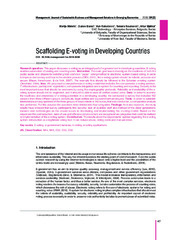Please use this identifier to cite or link to this item:
https://rfos.fon.bg.ac.rs/handle/123456789/2019| Title: | Scaffolding e-voting in developing countries | Authors: | Maletić, Marija Barać, Dušan Rakočević, Vuk Naumović, Tamara Bjelica, Artur |
Issue Date: | 2019 | Publisher: | Univerzitet u Beogradu - Fakultet organizacionih nauka, Beograd | Abstract: | Research question: This paper discusses e-voting as an integral part of e-government in developing countries. E-voting enables automation of casting and counting votes. Motivation: The main goal was to investigate the readiness of both the public sector and citizens for switching from common “paper” voting method to electronic system-based voting. In order to improve democracy and trust in the election process (IDEA, 2011), the e-voting system should be reliable, accurate and secure (Mauw, Verschuren, & de Vink, 2007). The example that should be followed is the Estonian e-voting system (Drechsler, 2004). Idea: We proposed a comprehensive e-voting model that includes five components: e-voting services, IT infrastructure, participants’ registration, components integration and a system for counting and reporting. Security is the most important issue that should be overcome by using the cryptographic protocols. Reliability and availability of the e-voting system should not be neglected, and it should be able to save all verified casted votes. Data: In order to examine the readiness and awareness of e-voting potentials in a developing country, we conducted a survey that included 152 persons from three different groups: individuals, legal entities and e-government employees. Tools: In order to establish relationships among opinions of the three groups of respondents to the survey that was conducted, a comparative analysis was performed. For this purpose the questions were divided into four categories. Findings: As it was expected, the study results have showed that survey participants find security, lack of qualified staff and mistrust of the older generations towards new technologies as the crucial issues in developing and implementing the e-voting model. Based on the responses the cost reduction, ease of use and efficiency improvement are recognized as categories that could be realized by implementation of the e-voting system. Contribution: The results show the respondents’ opinion regarding the e-voting system introduction as a legitimate voting tool. It can reduce abuse, voting costs and manual errors. | URI: | https://rfos.fon.bg.ac.rs/handle/123456789/2019 | ISSN: | 1820-0222 |
| Appears in Collections: | Radovi istraživača / Researchers’ publications |
Show full item record
Page view(s)
8
checked on Dec 28, 2025
Download(s)
4
checked on Dec 28, 2025
Google ScholarTM
Check
Altmetric
This item is licensed under a Creative Commons License


